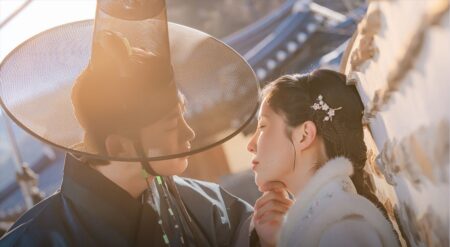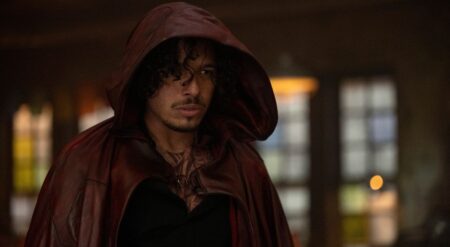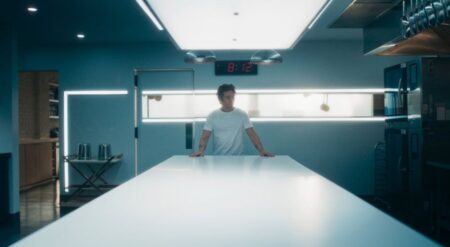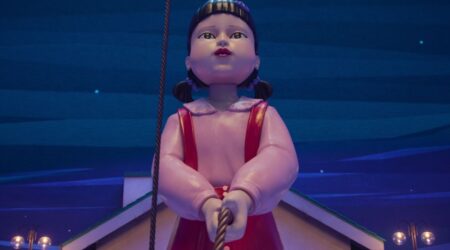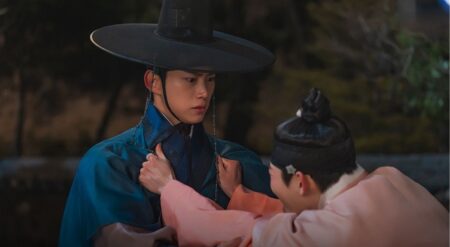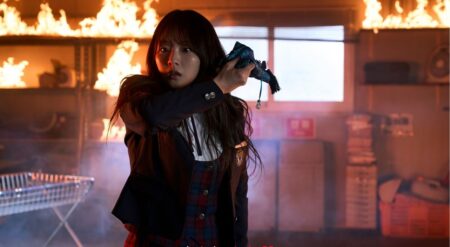
Kleo is a German-language spy thriller distributed on Netflix, created by Hanno Hackfort, Bob Konrad, and Richard Kropf. The show stars Jella Haase, Dimitrij Schaad, Julius Feldmeier and Vladimir Burkalov. Kleo is a Stasi assassin in East Germany, eliminating enemies in the West. But she is betrayed and sent to prison for years. So when the Berlin Wall falls and she escapes from prison, she begins a violent vendetta against anyone who had a hand in it.
Kleo has a stunning plot that builds in strength. The first episode brilliant sets everything up, from the characters to the mood to the setting, expertly displaying the tensions and the differences between the two sides of Germany. The betrayal is heartbreaking and brutal as Kleo is thrown into prison and suffers a profound tragedy. But the revenge is beautifully methodical and layered. This is a heavily political story, it would be impossible for it not to be, and it is integral to motivations within government agencies and secret services.
As Kelo is hunting down targets, others are hunting her down, creating a brilliant cat and mouse tail full of mistrust and anxiety. What the series excels at is progression. Each episode feels like a new stage of the season, with fresh players added to the mix. Some characters are introduced later in the script, but they are pivotal in the final act. The first episode may be the slowest, bogging down in the middle, but the pace does even out. There are moments of intense action, with some remarkable set pieces. Many of the plot threads end suddenly, with deaths coming from absolutely nowhere. This leads to some jaw-dropping revelations.
What i believed to be the ending of this season felt fitting and satisfying, concluding the story with some heart and warmth. But there is a small addendum that actually ruined it slightly for me, and it might be more in character and leave an open-ended pathway for more to come.
What makes this series shine is the main character and the performance that brings her to life. Haase is delightful in a show that spends so much time with just her. The layers are absolutely incredible. She is a tragic character who has lived a life of grooming and violence and following orders. She’s a badass fighter and spy. Part of the brilliance of the casting is the fact that Haase is short, making her fight scenes so much more epic. Haase is also a terrific, expressive actor who can emote superbly. She is traumatised and the exploration of what conditioning can do to a person is terrifying yet stunningly written.
There is a more extensive cast in Kleo, and the characters elsewhere are superb. Perhaps the most prominent co-star is Schaad, who plays Sven. He is a low-ranking fraud detective but he was present during one of Kleo’s murders and spends years trying to find the culprit. He is a tragic character in his own right as he is belittled and degraded when he is 100% correct. The interactions between the two as Sven hunts Kleo is superb, as severe animosity also flickers with sexual attraction. Andy (Burkalov) is Kleo’s former commanding officer and lover, one of the last people she trusts when she escapes. There is Uwe, played by Vincent Redetzki another Stazi assassin who is like a rabid. And there is Thilo, a West German drug addict who Kleo almost commandeers as a friend. Every character is hauntingly sad in their own way. The twists range from horrifying to comical, with the biggest of them absolute genius. Then there are the targets, most of them appear in the opening episode before things go wrong. Each person essentially gets an episode, showing brilliant character development.
This series is also a visual masterpiece. The variation between West and East Germany is fascinating and almost subtly introduced. The West is expressive, with nightclubs and colors and neon. It isn’t long in this series before the wall is brought down, so the two regions unite, but those differences take time to erode. The camerawork and direction are excellent. The aspect ratio is big but the characters are almost always dead centre, showing off the space. The locations are beautiful and striking, some sets remarkable in their creativity. Many staples of the 80sappear to affect a scene’s aesthetics, from carpets to cars. Episode 7 is largely a flashback, but most of it is placed in one room. Time still passes, but furniture and people are swapped around in sleek camera movements. It’s a unique and eye-catching method. The costumes also need particular mention, especially for Kleo. Just like every part of her, Kleo’s outfits are expressive. Some fit the time period, such as a new tracksuit. But there are also disguises, intentionally altering her. Haase can completely transform with a new wig and a colour palette. The yellow she wears often could be a clever nod to another warrior hellbent on revenge. The vibrancy and dedication to her styles and many characters provide this spy thriller with beauty.
Kleo is a creative, character-driven master stroke. It’s a revenge story but also a woman trying to reclaim her life as two countries become one. It may not be a perfect show but there are many parts of it that are. The most important perfection is Kleo, with a magnificent performance and script making a character that I couldn’t look away from. There are clear influences from Killing Eve and Kill Bill, but this is a story that is specific to the character and the country in which it is set. It isn’t full of action-packed set-pieces, focusing more on tension or artistic displays, but Kleo’s hunts are dramatic as hell. It is gorgeous to look at and cleverly shot, and achingly atmospheric.
Kleo is available now on Netflix.
Kleo
-
Rating - 8/108/10
TL;DR
Kleo is a creative, character-driven master stroke. It’s a revenge story but also a woman trying to reclaim her life as two countries become one. It is gorgeous to look at and cleverly shot, and achingly atmospheric.

